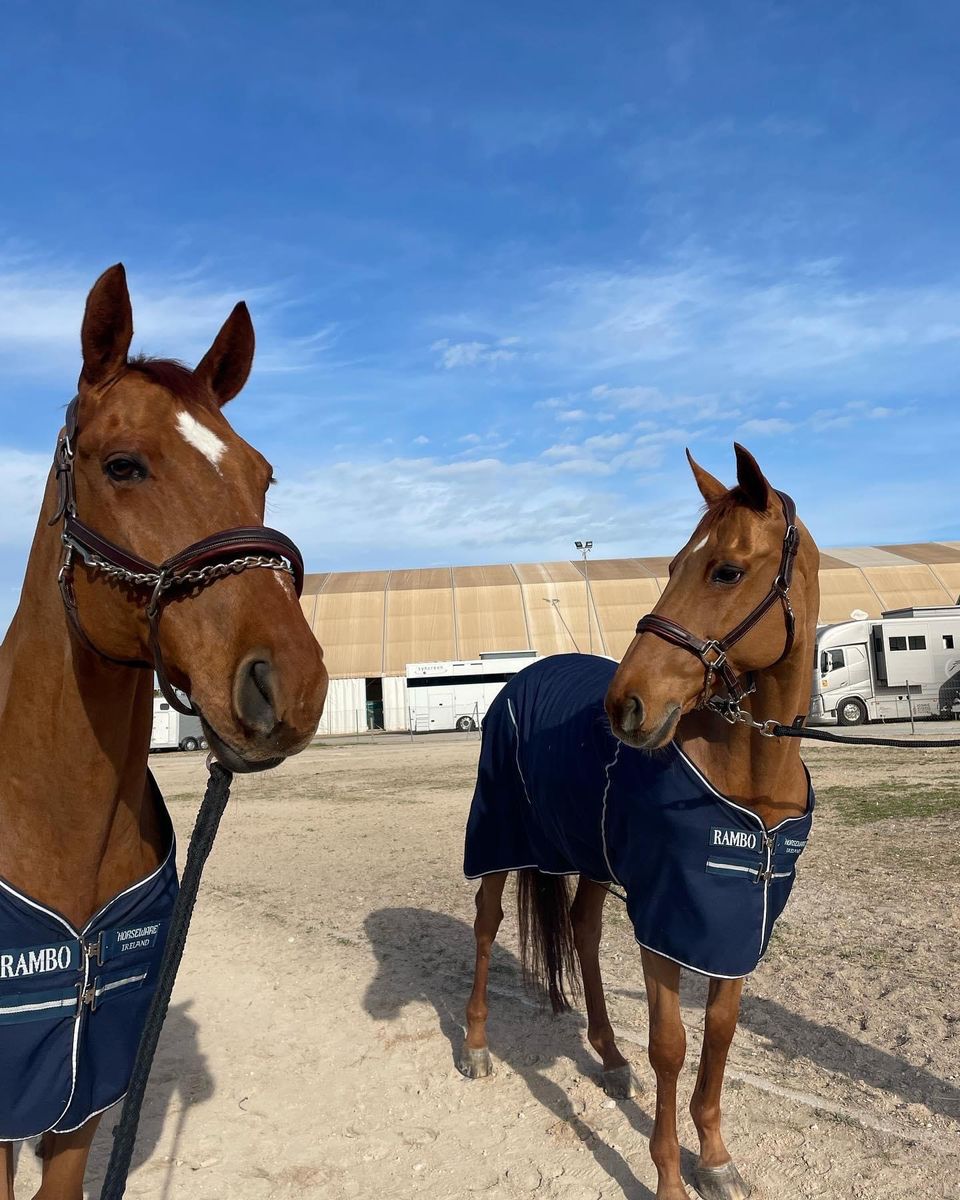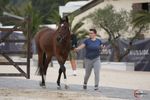Centre of an EHV Outbreak

The first show of the year for my team at Goess Showjumping didn’t exactly go according to plan. For the first two weeks our horses were in top form jumping out of their skin, we couldn’t have been any more delighted with them. Unfortunately, this was soon brought to an abrupt halt when a horse within our tent tested positive for Equine Herpes Virus(EHV), swiftly followed by many other horses.
What is EHV? Equine Herpes Virus is an extremely infectious airborne disease which usually targets the respiratory system. There are 9 forms, however EHV-1 and EHV-4 are the two most common and the two which we vaccinate for. Vaccinations however, do not stop your horse from getting infected, merely just limiting the symptoms and decreasing their chances of spreading it to others.
Back in 2021, exactly 2 years to the date of this current epidemic, there was a huge outbreak of EHV at Valencia showgrounds in Spain. It was a horrific time for both riders and grooms where 18 horses died throughout the whole ordeal and many others gravely ill. These horses were infected with the neurological form which attacked their spinal chords causing weakness and poor coordination, often leaving them unable to stand and needing to be held up with straps. There were photos going around social media at the time and they were painful to see, let alone being a person there and it being one of your horses. Luckily for me, I was not there to witness any of this, but having seen and read articles I was feeling very nervous for my horses.
Since the epidemic in 2021, the FEI has introduced measures to try prevent the disease - an example includes rectal temperatures being taken 2 x daily during and leading up to the event, all of which must be logged in the FEI app. Seems like a good measure however, the majority of people just bullshit it - it’s a very time-consuming process yet failure to do so will result in hefty fines and eventually blocking the horses from the FEI system leaving them unable to compete at international level.
On 20th February 2023...
there were some horses put into isolation who had slight temperatures, these horses were stabled directly next to us. This was done as a precaution as we all know temperatures can spike for multiple reasons. We initially weren’t too concerned. However, more and more horses within our tent started to get “colic” like systems and it just started to seem a bit too suspicious for my liking. We continued with our daily routines of riding and we had the vet check in preparation for the 3rd and final week ahead.
At this stage nobody had been saying much. The young horses had started jumping on the Tuesday and we thought everything was going to be okay. By the following day we knew something wasn’t right- there was a lot of civil police scouting the venue talking with FEI Stewards and vets. It wasn’t until later that evening they held a meeting to let all athletes know there was an outbreak in Tent 3, my tent, and that the show was being cancelled. As luck would have it, I was also battling a vomiting bug at the same time which had me kneeling over the toilet for hours on end pleading with the gods to give me a break!
All except those in Tent 3, were allowed to pack up and leave immediately and we were put into lockdown. No horses in. No horses out.
Panic was internally setting in, but I knew I had to remain somewhat calm on the outside for everyone on our team.
At this point, all we could do was disinfect everything around us and hope we would be ok. We were left in that tent with possible infected horses for 48 hours before our PCR tests came back, after which we were separated accordingly. As it’s an airborne virus and 8 of the 82 horses in the tent were ours, the numbers weren't on our side. The odds of our horses escaping without infection seemed slim.
The PCR results returned from all 82 horses in Tent 3...
14 tested positive while 5 came back "doubtful".
Vets however considered "doubtful" cases to be positive. Immediately, those 19 horses were put into isolation while our horses remained where they were. The following morning we were distributed throughout the show venue to gain space between all horses. At this stage, FEI stewards were coming to monitor all horses temperatures 3 x daily and we were assigned designated areas for riding.
Finding a brightside...it was fantastic experience for me to be able to ride in the main arena of MET on these top-class horses (albeit only a bit of flatwork, I cannot complain!)
Then came the involvement of The Department of Agriculture in Madrid. They wanted to clamp down on us leaving. Initially, it was said that we needed one more PCR 7 days later and then it was moved to 14 days later with two consecutive tests, 1 day apart.
It was obvious our horses were healthy, and we felt it was safer for our horses to be back at home in our own yard where they could further isolate while also getting paddock time and their own beds. We managed to negotiate with the Spanish authorities, and after another negative PCR test, we were able to head home to continue our isolation. This is where we are at now. Our horses will get a further two PCR tests, 7 days apart, before being allowed to go back on the FEI system.
Being surrounded by sick horses on both sides, left and right as well as behind both of my rows, I am quite shocked that our horses managed to stay infection free...It’s a miracle really!
We are so grateful that our horses are happy and healthy and at home in their beds.
I will never underestimate the power of having the horses on the right feed and supplements all ensuring they have healthy immune systems.
Luckily, all the sick horses have started to recover and those that started showing some neurological signs got immediate veterinary attention and are on the mend. Thankfully this outbreak hasn’t been as serious as the epidemic in the past, but it does swiftly remind you that anything can strike at any time. I guess it's true when they say "horses really keep you on your toes."




